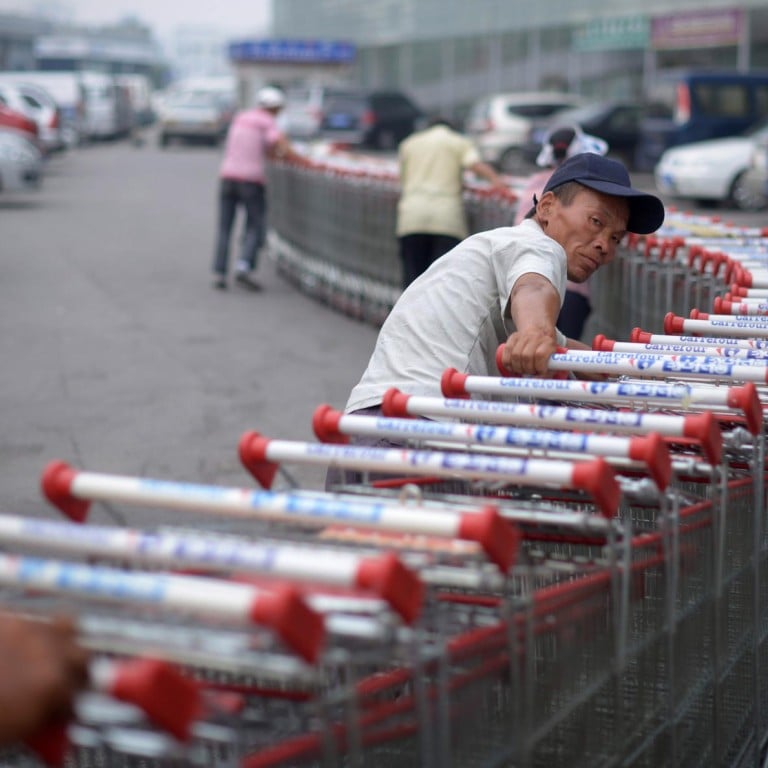
Xi Jinping takes charge of China's economic reforms
President takes charge of the mainland's economic reforms, a task that had been the responsibility of the premier
China observers are having to get up to speed with the "new normal" now required of their divining of the nation's policymaking.
The term, aired by President Xi Jinping last month, was originally aimed at reminding people of the transitional phase that the economy has entered, marked by a slower pace of expansion and structural reforms. But the term has gained added significance with its attachment to the president himself and the marking out of a greater role by the top Communist Party leader in the economic sphere - usually the policy domain of the premier.
Xi has now indicated he is the man to set the economic agenda for the country, although political needs may deeply influence or even override planned reforms.
The president is becoming much more visible than Premier Li [Keqiang]
On Friday, Xinhua reported on a meeting chaired by Xi that discussed a grand plan for securing the country's future energy demands. For the first time, Xi was mentioned as head of a powerful leading panel that oversees financial and economic affairs, a position that had usually been held by premiers.
Government researchers told the they were not surprised by the development, given that Xi already heads a newly created panel with the final say on overall social and economic reforms.
Xi is not the first top leader to become heavily involved in economic issues, but he is perhaps emerging as the most activist leader on this front since the late Deng Xiaoping drafted the path for the opening up of markets in the 1970s.
"The president is becoming much more visible than Premier Li [Keqiang]," said Richard Harris, the chief executive of consultancy Port Shelter Investment Management.
Harris wrote on so-called Likonomics in July last year, when he forecast Li might become a strong "change leader", with shades of prominent Western economic reformers such as Ronald Reagan of the United States or Britain's Margaret Thatcher. Harris has since reviewed this assessment after seeing some of the reforms pledged by Li fall short of expectations.
Some experts have shared the frustration, citing lacklustre consumption, slow progress in financial liberalisation and persistent state dominance.
A continued slowdown in economic growth, to an 18-month low of 7.4 per cent in the first quarter, also exacerbated doubts over the effectiveness of Li's policies.
"The Likonomics reform has been put in a holding pattern," Harris said.
The top leadership was likely to "get political issues right first" while keeping the economy in a "weak and stable condition".
He expects stability will feature high in Xi's thinking - or "Xiconomics" - under which anti-corruption, administration reform and regional security issues take priority, even though these steps in the near term may hurt the shift towards a more consumption-led economy.
But He Keng, a former vice-chairman of the Financial and Economic Committee of the National People's Congress, said he was confident in Xi's ability to tackle economic problems. "I'm sure he has a very good understanding of China's economy," he said.
In the past year, Xi broached ambitious Silk Road plans in a bid to develop the country's region - with road and sea connections - as part of an effort to shore up strategic and trade links with the rest of Asia as well as some countries in Europe, such as Russia.
Xi has also sought to explore new growth momentum through the formation of economic belts such as the Beijing-Tianjin-Hebei zone, which aims to fix imbalances in resource allocation among the three regions.
Sources familiar with the matter said earlier Xi last year ordered a rewrite on a draft of China's urbanisation blueprint that had originally been overseen by Li.
The final version came out with less emphasis on heavy investment and more attention on people's livelihoods and narrowing the urban-rural income gap, they said.
The reweighting was motivated in part by concerns to avoid a repeat of the old model of growth that had fuelled high inflation and bad debt at local governments, they said.
Xi had gained exposure to grass-roots problems when he spent years in a rural part of Shaanxi province. He also accelerated growth in Zhejiang when he headed the affluent province by upgrading the local industries and boosting its per capita gross domestic product to among the highest in the country.
Most researchers, however, do not see fundamental disparities between Xi and Li's thinking, saying they are both reform-oriented. Having Xi, who is familiar with economic development, as the chief architect of China's reform, may boost the efficiency of decision making, they say.
Some analysts say Li, the No2 in the political hierarchy with a doctorate in economics from the elite Peking University, should be credited with moving the economy on the right track as part of rebalancing efforts, although they note the effect of these policies may only be felt years later.
Huang Yiping, a professor at Peking University who coined the Likonomics term while at Barclays Capital last year, said the three pillars of the ideology he pointed to a year ago remained true today: no major stimulus, deleveraging and structural reforms.
Stephen Roach, a Yale University professor and former chairman of Morgan Stanley Asia, said Li's mini-stimulus should be successful "in tempering the cyclical pressures while allowing China to stay the course of its structural reforms".
"This is a key underpinning of China's rebalancing strategy and Premier Li deserves credit for pulling it off," Roach said.

